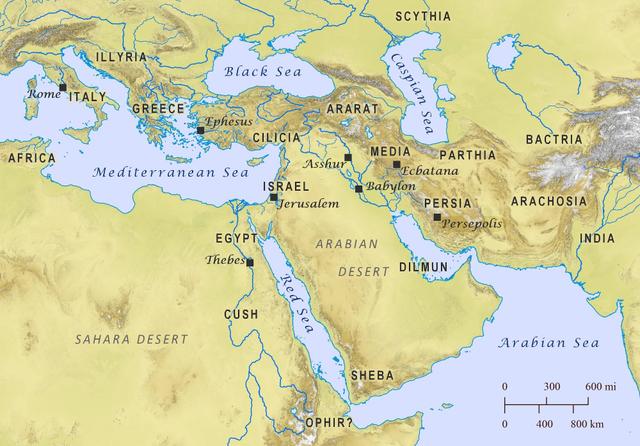James greets his intended recipients, the Jewish believers who are scattered throughout the world.
James gives a preface to his letter by identifying himself and those to whom he writes. James makes his appearance as a leader in the early New Testament church in Acts 15 and is generally accepted as being a son of Joseph and Mary, the earthly parents of Jesus. In Acts 15:13, and again in Acts 21:18, James is given special recognition as an elder, and speaks on behalf of the elders of the Jerusalem church, indicating he was the head elder. Rather than making a claim to his earthly status as the son of Mary and the half-brother of Christ, James identifies himself as a bond-servant of God and of the Lord Jesus Christ.
A bond-servant (slave) was one who was owned by another, a common part of the economy in the Greco-Roman world of that time. The Greek word translated bond-servant is often translated “servant,” and is translated “servant” in many translations of James 1:1. Spiritually, the role of a bond-servant is one who is dedicated to doing the will of his master.
For James, his master is identified as the Lord Jesus, who is the Christ, as well as God. The word Christ is a designation of anointing or being approved and separated unto God for service. A Jewish audience seems likely to have read this as James saying he is a bond-servant of God, Yahweh the Existent One and covenant God of Israel, as well as his Lord who is the Christ, or One anointed of God to be the messiah and ruler of Israel, who is Jesus, his human half-brother.
This is a remarkable assertion by James, given that the New Testament indicates that Jesus’s brothers did not believe He was the Christ, the anointed of God, during the time of His earthly ministry (John 7:5). This is another powerful proof of the resurrection of Jesus. Jesus’s own disciples lost faith in Jesus after His death, and did not believe the report of women that He had risen, even though Jesus told them plainly this was what would transpire (Mark 16:9-11; Matthew 16:21-23). The only reasonable explanation for their remarkable turnaround was that they saw Jesus resurrected (John 20:24-27; 1 Corinthians 15:6).
By choosing the term bond-servant to describe his station, James is modeling the life-change he wants for his readers by emphasizing his own move from earthly brother to faithful servant. Rather than choosing to assert his authority as an elder and church leader, James here emphasizes that his primary goal is to serve Christ. He will do so by providing useful and helpful instruction to those in his care. James is not trying to assert control, through elderly authority. James is serving his master, Jesus, through the means of providing this direction and instruction.
The recipients of the letter are the members of the twelve tribes of Israel who are dispersed abroad. This is a reference to Jewish believers of the “diaspora” (lit. to scatter across). These were Jews who had fled, been exiled or otherwise migrated out of Israel to the rest of the world. The Greek root-history of our English word ‘disperse’ comes from the Greek word “diaspora.” In verse 1, “diaspora” is translated to English as dispersed. The twelve tribes of Israel refers to the entirety of the Jewish race.
While ethnic and religious Jews of all beliefs were scattered abroad, James is writing specifically to his Jewish brothers in Christ, those who had believed upon Jesus as the Messiah, as he makes clear by identifying himself as a bond-servant of the Lord Jesus Christ and by referring to them as ‘my brethren’ (James 1:2). While James acknowledges their Jewishness, he elevates their relationship to that of being like him, an adopted child of God by faith and not merely by physical heritage (Galatians 6:15).
Biblical Text
1 James, a bond-servant of God and of the Lord Jesus Christ, To the twelve tribes who are dispersed abroad: Greetings.
Check out our other commentaries:
-
Zechariah 14:16-21 meaning
Zechariah predicts a day when the survivors among the nations will go to Jerusalem yearly to celebrate the Feast of Booths and worship the LORD....... -
3 John 1:1 meaning
John begins his letter by referring to himself as an elder, rather than an apostle, to put himself on equal footing with his recipient, Gaius....... -
Exodus 8:1-15 meaning
The second plague involves an overwhelming infestation of frogs. There was to be no place in Egypt where the frogs were not present in large...... -
Matthew 8:23-27 meaning
Jesus gets into the boat to go to the other side of the sea and His disciples follow Him. As they cross the sea, a...... -
Ecclesiastes 4:9-12 meaning
Working together is better than working alone......



